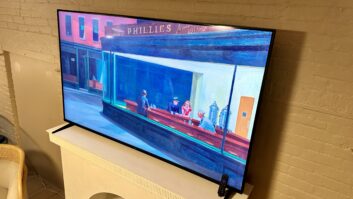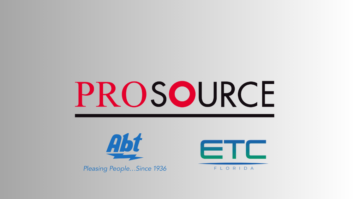Dana Point, Calif.
– Progressive Retailers Organization (PRO Group) executives further detailed
the 2012 strategies outlined in the “State of the Industry” presentation on
Wednesday during a briefing with TWICE.
Dave Workman,
president/COO of PRO Group, and George Manlove, Vann’s president/CEO and
chairman of PRO, were joined by PRO board member and president of ListenUp Walt
Stinson in discussing its ProSource partnership, eBay plans, channel management
and the current CE market for the group
in the coming year.
TWICE:
How will
the new ProSource organization help PRO and Home Entertainment Source members
become more competitive?
Workman:
Under
ProSource we can come up with an aggregate buy. We are not a
“one-size-fits-all” group, but we can optimize the size of our [retail] sales.
[Editor’s note: ProSource has $3.1 billion in annual sales.]
Second, the
business is changing. Dealer classifications, how dealers want to be handled by
vendors and vice-versa is changing. Inventory [as discussed in their formal
presentations] is a liability now vs. an asset. And there are new business
models. We are not a distributor but a fulfillment model. We approach our infrastructure
as one to build business models.
We also have a critical mass in certain
categories. In audio categories we may be No. 2 in the industry behind Best
Buy. Other times we may be No. 1.
And with ProSource,
our focus is still the mid- to upscale products. Not just the $3.1 billion.
Vendors can make money on these types of products.
TWICE:
How are the
new unilateral pricing policies working out so far? A work in progress?
Manlove:
I would
say a work in progress. It is a challenge for everyone involved, including the
consumer.
Workman:
A policy
can’t just be channel management … it could lead to overreaching. Sometimes unilateral
pricing will [result in] selling the product to everyone for the same price …
and [the products] will then not be special to anyone.
We live in a
multichannel world that is changing, and we must make [business] decisions
around that multichannel world.
TWICE:
What is the
current status of PRO’s eBay initiative? How has it been accepted by vendors?
Workman:
When you
change the rules, sometimes you get resistance because it is change. eBay has
been known as an auction site. They don’t want to abandon what they have done, but
in certain categories they want to be a full-fledged marketplace.
Amazon is very important
[as a marketplace] but sometimes it isn’t good to be in competition with your
host. eBay provides Milo, Paypal and a suite
of services that they can bring to the dealers. It just doesn’t list products.
TWICE:
How are
inventories? Do you expect some shortages?
Stinson:
I expect that output [in video] will go down.
I see the market having bottomed out in
supply. I don’t see audio having the problems video had. I see a change with
video vendors this year. It is about profitability now for them too. Hopefully
it will be profitable for both them and us.
TWICE:
As a group,
or individually, what CE categories are you adding this year?
Workman:
In
cameras we have some of the best retailers around. One area that we may pick up
is the whole car audio electronics category, which is doing well.
The concept of
digital audio and make it sound as good as possible … and making it as easy as
possible to work is growing. Walt has been on the forefront of educating the
consumer in that area. And we were early in headphones, which continue to be
popular.
TWICE:
Have Best
Buy’s problems given CE retailers like yours a black eye in the minds of your
consumers?
Manlove:
There is
no influence there. We hear more about Amazon’s influence [on consumers] than
anything else.
Workman:
Part of
Best Buy’s challenge is all the [negative] headlines and the pundits. But the
foundation elements of its problems are that big selection and lower price of
big boxes have been taken away by the Internet. That will not change. But the
people at Best Buy know that things run in cycles. They will reinvent
themselves. They have also been caught up in the industry trends we’re all
facing.
Stinson:
Remember
that this is a big-box [retail] trend and not just a problem for Best Buy or
even only the CE industry.
TWICE:
What
categories are doing well now?
Stinson:
The
luxury segment is rebounding nicely. [The industry] was in overcapacity in 2008,
and we have been adjusting ever since then. We downsized and right-sized [ListenUp].
Now we have to hire people and add inventory. We right-sized for 2010 but by
2011 we have begun to expand. My sense is that industry has bottomed out.
For manufactures,
they are behind the curve. Maybe they are not as close to the street as we are.
Maybe they are behind because the problem is global.
There is a
bounce-back in custom and two-channel … but not in video, not yet.
TWICE:
So what
does all this mean for your type of retailers this year?
Workman:
The
Consumer Electronics Association estimates that the industry will grow this
year, but the growth will focus on tablets and smartphones, and to a certain
extent, readers. But legacy categories like audio and video will not.
Who is controlling
tablets and smartphones?
To all this, you
add the migration of retail sales to the web. That also points to the problems
that the big-box retailers have will continue.
For retailers like
ours you have to pick your targets well and become more focused, not less,
leveraging all your experience and advantages.













